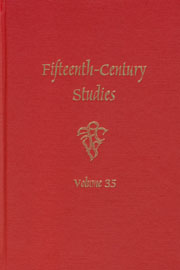Book contents
Preface
Published online by Cambridge University Press: 12 September 2012
Summary
In 1978, Fifteenth-Century Studies appeared for the first time, with over a dozen articles on topics ranging across European culture. By pursuing an international and scholarly course over the past three decades, the editors have developed FCS into a leader in late medieval research, especially in the humanities and social sciences. Under the steady guidance of Professor Edelgard E. DuBruck, the journal has supported scholarly communication by consistently presenting its readership with excellent articles, stretching over a broad panorama of interdisciplinary approaches and subjects. Professor DuBruck's generous leadership and wide-ranging interests have made FCS an indispensible resource for all who pursue research in the late Middle Ages.
Fifteenth-Century Studies has always provided a forum for established and newer scholars to posit innovative ideas and explore fresh territories of fifteenth- century culture, and volume 35 is no exception. True to its international heritage, this volume continues the journal's traditional representation of cultures from across Europe. At the same time, the fifteenth century remains a time of cultural, technological, and social transformation that still provides uncharted horizons for scholars to sail towards – whether actual horizons such as eastern, southern, or northern Europe, or figurative horizons like the re-formation of book culture or the changes reflected in society, science, law, theology, art, and elsewhere. Indeed, there may not be a fifteenth century, but rather numerous fifteenth centuries for us to explore.
- Type
- Chapter
- Information
- Fifteenth-Century Studies , pp. ix - xPublisher: Boydell & BrewerPrint publication year: 2009



